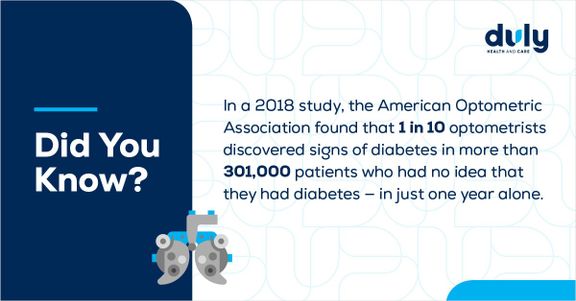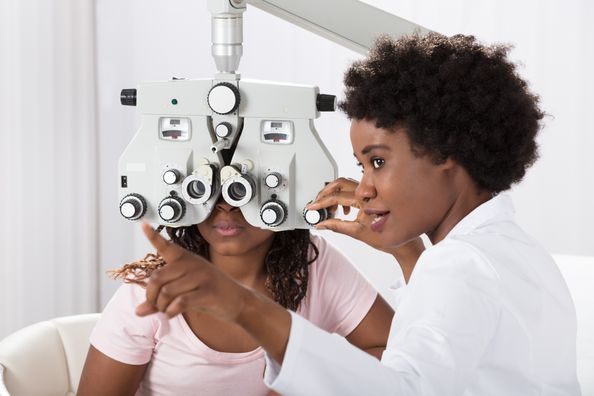Whether it’s to get help for blurry vision or it’s just that time for another vision test, you know where to go: the eye doctor.
It’s common for people to simply say “eye doctor,” but not everyone knows which type of eye doctor they need to see.
Eye doctors can be either ophthalmologists or optometrists. They both have doctorate degrees — so they both earn the title of eye “doctor” — but they’re actually different types of doctors.
Ophthalmologists are medical doctors. Just like other specialists, such as cardiologists and neurologists, they complete medical school and additional training in their field. They are licensed to perform surgery and practice medicine.
Optometrists are healthcare professionals with doctorate degrees, but they are not medical doctors. Unlike ophthalmologists, they do not attend medical school. However, this doesn’t mean that they don’t go through rigorous training and education. After completing 2 to 4 years of college-level education, they attend optometry school for 4 years and become a Doctor of Optometry.
Both types of providers share similar skills and responsibilities, so it can be a little confusing if you’re not sure which one to go to.
Here are 5 eye health situations — and which type of eye care provider can give you the best care.
1. When you need a vision test or routine care
For primary vision care, you can see either an optometrist or an ophthalmologist. But, in most cases, if you don’t have a complex eye disease, an optometrist is usually a safe bet.
Optometrists are experts at primary care needs for your eyes. These include “everyday” eye care, such as:
- Performing routine eye exams to look for problems with your vision and signs of injury or disease in your eyes
- Prescribing glasses or contact lenses
- Prescribing medications for some eye diseases (only in certain states, including Illinois)
- Referring patients to specialists
In addition, optometrists can find signs of other potential health problems, from high blood pressure to diabetes.

2. When you need care for a more complex eye condition
Ophthalmologists are qualified to do the same types of routine care as optometrists. But as providers who have gone through medical school and 12 to 14 years of training and education, they have additional qualifications.
Beyond primary vision care, ophthalmologists can diagnose and treat a wider range of eye conditions than optometrists. Many ophthalmologists become subspecialists, meaning they complete extra training in specific areas. Some of the main subspecialties are:
- Glaucoma (a group of eye diseases where the nerve at the back of your eye — the optic nerve — is damaged and causes vision loss)
- Retina (a layer of tissue in the back of your eye)
- Cornea (the clear outer layer that sits at the front of your eye)
- Oculo-plastic surgery (procedures to repair problems with structures around the eyeball as well as injections near the eyes for cosmetic purposes)
- Neurology (treating conditions that have to do with how your brain and eyes interact, such as multiple sclerosis, thyroid eye disease, brain tumors, or stroke)
Questions about your eye health? Schedule an appointment with a Duly Health and Care ophthalmologist.
3. When you have diabetes
Diabetes is the main cause of preventable blindness in the US.
One of the main eye problems that can arise from diabetes is diabetic retinopathy. This is when high levels of blood sugar damage the blood vessels in your retina, which can then result in vision loss.
It’s recommended that people with diabetes get a complete dilated eye exam (an exam where your eye doctor widens your pupils to look at the back of your eyes) once a year to look for early signs of diabetes-related eye conditions like diabetic retinopathy. Since this is a more routine exam, you can see either an optometrist or ophthalmologist.
However, once you have been diagnosed with a diabetes-related eye condition, you will likely need to see an ophthalmologist — especially if the disease is severe. Diabetic eye diseases are serious and can cause permanent vision loss or blindness if they aren’t treated. An ophthalmologist with special training can provide more advanced treatment than an optometrist, including surgery.
(And of course, you should keep working with your primary care provider or endocrinologist on keeping your blood sugar in check.)
Ready for your annual diabetic eye exam? Schedule with a Duly optometrist today.
4. When you need eye surgery
An optometrist may recommend looking into surgery, but they can’t actually perform it. For that, you will need to see an ophthalmologist. Here are some common eye surgeries that ophthalmologists perform:
- Cataract surgery removes a cataract — a cloudy area in your eye’s natural lens that makes it difficult to see clearly — and replaces it with an artificial lens.
- Corneal transplant removes part of your cornea and replaces it with donor tissue.
- Glaucoma surgeries remove pressure from your eyes to protect vision and prevent further damage.
- Retina surgeries repair a retina that has been damaged or has become detached.
Also read: “10 Ways to Maintain Your Eye Health”
5. When you have sudden vision loss or changes in vision
See an ophthalmologist as soon as possible — or skip the eye doctor and head straight to the emergency room.
Sudden vision loss is when vision changes develop within just a few minutes to a few days. The loss can be partial or complete, and can be in one or both eyes. It is considered a medical emergency and may be due to:
- Retinal artery occlusion (eye stroke that’s caused by blockage in your retina’s arteries, and that can increase your risk for having a stroke in the brain)
- Retinal vein occlusion (a blockage in the small veins that are responsible for carrying blood away from your retina)
- Stroke or transient ischemic attack (a temporary blood flow blockage to your brain that is sometimes considered a “warning stroke”)
- Retinal detachment (your retina is pulled away from the back of your eye, potentially causing permanent vision loss)
Depending on the cause of your vision loss, you may need to see additional specialists. For instance, if your sudden vision loss was caused by a stroke, your provider might refer you to a neuro-ophthalmologist (an ophthalmologist who specializes in vision loss due to a neurological problem).
No matter which specialist you see, pay attention to your eyes and vision, and get them checked regularly. Eye care doesn’t just help you see better — it helps prevent vision loss in the future and can be a window into your overall health.
Health Topics:







